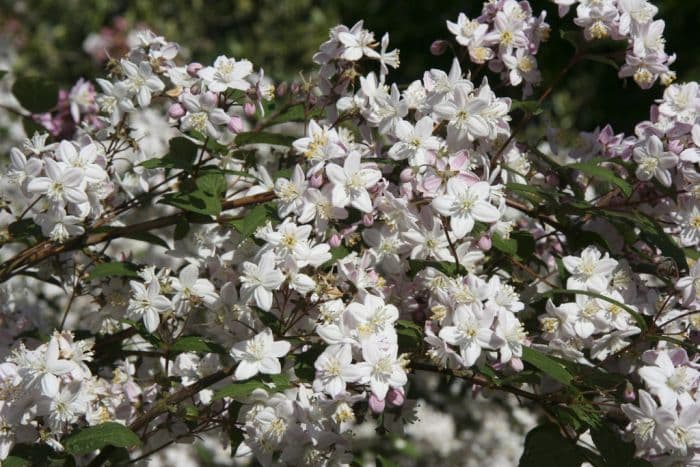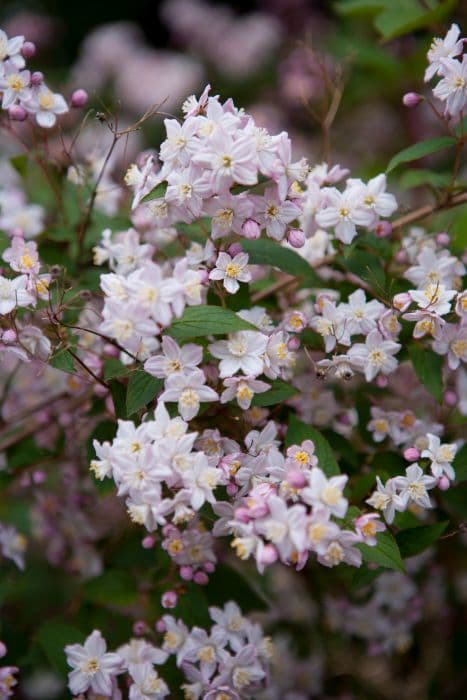Fuzzy Pride of Rochester Deutzia × elegantissima 'Fasciculata'

ABOUT
Deutzia × elegantissima 'Fasciculata', more commonly known as Deutzia, is a decorative shrub that boasts a bustling display of charm and elegance in gardens and landscapes. Its most striking feature is the abundance of flower clusters that bloom in spring. These flowers are typically white, sometimes adorned with a pink blush, and are densely packed together, forming a brush-like appearance. The flowers of the Deutzia emerge on stems that are covered with fine, short hairs, adding a soft, velvety texture to the touch. When not in bloom, the shrub is still visually appealing thanks to its foliage. The leaves of the Deutzia are typically oval-shaped with fine-toothed margins and arrive in a bright green color, which makes a lovely background for the springtime display of flowers. As the seasons change, so does the foliage, often taking on yellow or bronzy hues in the fall, providing a delightful contrast against the more muted tones of the autumn landscape. It is this combination of springtime floral abundance and attractive foliage that makes the Deutzia × elegantissima 'Fasciculata' a favored choice for gardeners seeking to add a touch of refined beauty to their outdoor spaces.
About this plant
 Names
NamesFamily
Hydrangeaceae
Synonyms
Fuzzy Pride of Rochester, Elegant Deutzia
Common names
Deutzia × elegantissima 'Fasciculata'.
 Toxicity
ToxicityTo humans
Deutzia × elegantissima 'Fasciculata', commonly known as Fuzzy Deutzia or Elegant Deutzia, is not widely recognized as a toxic plant to humans. There is limited information available on its toxicity; however, most Deutzia species are not known to cause harm when touched or ingested. Despite the apparent lack of toxicity, it is generally advisable to avoid eating any part of ornamental plants due to the potential for allergic reactions or unforeseen toxicities.
To pets
Fuzzy Deutzia is not commonly listed as a toxic plant to pets, including cats and dogs. Though it isn't specifically known to be poisonous, it's still wise to discourage pets from ingesting the plant, since the digestive systems of animals might react differently to various plant species compared to humans. If a pet does ingest Fuzzy Deutzia and shows signs of distress, it's best to consult a veterinarian. Symptoms of plant poisoning in pets can include vomiting, diarrhea, drooling, or changes in behavior, but these symptoms are not specifically associated with the Fuzzy Deutzia since it is not well-documented as a toxic plant.
 Characteristics
CharacteristicsLife cycle
Perennials
Foliage type
Deciduous
Color of leaves
Green
Flower color
Pink
Height
5 feet [1.5 meters]
Spread
4 feet [1.2 meters]
Plant type
Shrub
Hardiness zones
5
Native area
Asia
Benefits
 General Benefits
General Benefits- Ornamental appeal: Deutzia × elegantissima 'Fasciculata', also known as Elegant Deutzia, has attractive flowers that enhance the visual appeal of gardens and landscapes.
- Seasonal interest: It blooms in late spring to early summer, providing a seasonal display of color when many other plants are not in flower.
- Pollinator-friendly: The flowers attract bees and butterflies, supporting local ecosystems and pollinator populations.
- Low maintenance: Elegant Deutzia is known for being easy to care for, requiring minimal pruning and being relatively pest and disease-resistant.
- Hardy: This plant is tolerant of a variety of soil types and can handle some degree of urban pollution, making it versatile in different landscapes.
- Compact size: With its modest size, it is suitable for small gardens or as part of mixed borders without overwhelming the space.
 Medical Properties
Medical PropertiesThis plant is not used for medical purposes.
 Air-purifying Qualities
Air-purifying QualitiesThis plant is not specifically known for air purifying qualities.
 Other Uses
Other Uses- Photographic Subject: Deutzia is often used by photographers, both professional and amateur, as a subject for photography due to its attractive blossoms and general aesthetic appeal.
- Floral Art and Ikebana: The branches and flowers are suitable for use in floral art, including the Japanese art of Ikebana, due to their delicate appearance and form.
- Wedding Decorations: With its elegant flowers, Deutzia is a popular choice for wedding decorations, including table centerpieces and bouquets.
- Craft Projects: Dried Deutzia flowers can be incorporated into craft projects like homemade paper, potpourri, or wreaths.
- Culinary Garnish: Although not commonly consumed, the flowers can be used as an organic garnish for special dishes, provided they are free of pesticides.
- Educational Material: Deutzia species can be used in schools or botanical studies to educate students about plant growth, hybridization, and care.
- Mood Enhancement: The sight of blooming Deutzia can enhance mood and reduce stress when planted in personal or community gardens.
- Fairy Gardens: Due to its size and shape, Deutzia is sometimes used to create miniature landscapes or fairy gardens.
- Horticultural Shows: Deutzia is chosen for display in horticultural shows and competitions for its aesthetic qualities.
- Winter Garden Interest: Although primarily known for its spring blossoms, the peeling bark of some Deutzia species can add interest to winter gardens.
Interesting Facts
 Feng Shui
Feng ShuiThe Deutzia is not used in Feng Shui practice.
 Zodiac Sign Compitability
Zodiac Sign CompitabilityThe Deutzia is not used in astrology practice.
 Plant Symbolism
Plant Symbolism- Purity - The Deutzia × elegantissima 'Fasciculata', known commonly as the Fuzzy Pride of Rochester, often bears white flowers which have traditionally been associated with purity and innocence.
- Beauty - With its elegant blossoms, the Fuzzy Pride of Rochester symbolizes beauty and grace, reflecting its delicate and attractive flowers.
- New Beginnings - The blooming of the Fuzzy Pride of Rochester heralds the onset of spring, making it a symbol for new beginnings and renewal.
 Water
WaterThe Fuzzy Deutzia should be watered thoroughly, so the soil is moist but not soggy. During active growth in the spring and summer, watering might be needed once a week, depending on the weather conditions. Always check the top inch of the soil for dryness before watering. If it is dry, water the plant with approximately one gallon of water, ensuring that excess water can drain freely. Reduce watering frequency in the fall and winter when the plant is not actively growing.
 Light
LightThe Fuzzy Deutzia thrives best in full sun to partial shade. Ideally, plant it in a spot where it can receive at least six hours of sunlight daily. Too much shade can result in fewer flowers and a less dense habit.
 Temperature
TemperatureFuzzy Deutzia is hardy and can withstand a range of temperatures. The ideal growing temperatures are between 60°F and 75°F. It can tolerate minimum temperatures down to approximately 20°F and maximum temperatures up to around 90°F.
 Pruning
PruningPruning the Fuzzy Deutzia should be done to maintain shape, promote vigorous growth, and enhance flower production. The best time to prune is immediately after the plant has finished blooming in late spring or early summer. Cut back the stems that have just flowered by about one third, and remove any dead or damaged wood.
 Cleaning
CleaningAs needed
 Soil
SoilFuzzy Deutzia thrives in well-draining soil rich in organic matter with a pH range of 6.0 to 7.5. The ideal soil mix can be made by combining two parts garden soil, one part peat moss or compost, and one part perlite or coarse sand to ensure proper drainage. Mulching around the plant will help retain soil moisture and provide nutrients as it breaks down.
 Repotting
RepottingFuzzy Deutzia should be repotted every 2-3 years to refresh the soil and allow room for growth. It is best repotted in the spring before the onset of new growth. Select a pot that is slightly larger than the current one, ensuring it has adequate drainage holes.
 Humidity & Misting
Humidity & MistingFuzzy Deutzia prefers average to high humidity levels. While it can adapt to lower humidity, maintaining a level around 40-60% will ensure healthy foliage and optimal growth conditions.
 Suitable locations
Suitable locationsIndoor
Provide bright, indirect light and keep soil evenly moist.
Outdoor
Plant in partial shade, ensure soil is well-draining and fertile.
Hardiness zone
5-8 USDA
 Life cycle
Life cycleThe Deutzia × elegantissima 'Fasciculata', commonly known as Elegant Deutzia, begins its life cycle as a dormant seed which, when sown and with suitable conditions, germinates to form a small seedling. The seedling establishes roots and sprouts its first sets of true leaves as it develops into a young plant, experiencing vegetative growth. As the plant matures, it enters the flowering stage, typically in late spring to early summer, producing clusters of small, star-shaped, white blossoms that are attractive to pollinators. After pollination, the flowers give way to the formation of seeds, ensuring the continuation of the plant's life cycle. During autumn, the plant may enter a period of dormancy, with leaves that may turn (depending on the variety) before falling off, allowing the plant to conserve energy. The Elegant Deutzia repeats this annual cycle, with the possibility of spreading through new seedlings or vegetative propagation techniques such as cuttings.
 Propogation
PropogationPropogation time
Spring to Summer
Deutzia × elegantissima 'Fasciculata', commonly known as Fuzzy Pride of Rochester, is most effectively propagated through softwood cuttings. The best time for this method is in late spring to early summer when new growth is still flexible but starting to mature. Cuttings should be about 4-6 inches (10-15 centimeters) in length, with the lower leaves removed. The base of the cutting is then dipped in a rooting hormone powder or solution to enhance root development and planted in a well-draining soil mixture. It is crucial to maintain high humidity around the cuttings by placing them in a covered environment such as a propagation chamber or under a plastic dome, while ensuring they receive plenty of indirect sunlight. Roots typically begin to form within a few weeks, and once they have developed a good root system, the new plants can be transplanted to individual pots or into the garden.





![Hydrangea [Early Sensation]](/_next/image?url=https%3A%2F%2Fplants-admin.emdemapps.com%2Fimages%2Fplants%2F%2Fimages%2F604b6150338db.png&w=640&q=75)



